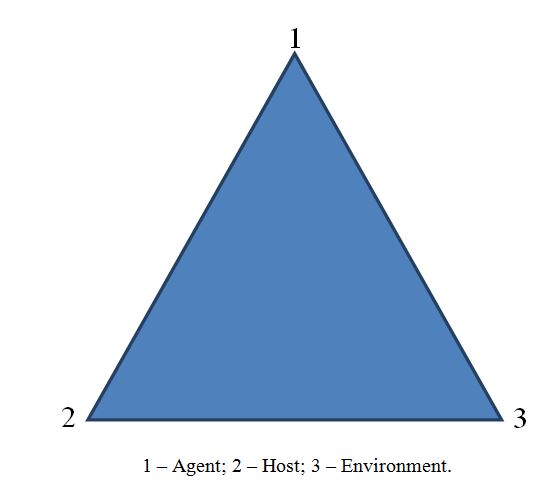Background
The epidemiological triangle is the method to analyze the conditions and factors contributing to the virus spreading. This method includes the prescience analysis of the three aspects of virus spreading (Tapia & Tan, 2021). The first one is related to the agent or microorganism being an actual cause of the disease. The second is the host, which is connected with the living organisms serving as an infected vector leading to further contamination. The last factor is the environment in which the virus or disease develops actively. The current paper focuses on analyzing the aspects of the epidemiological triangle for COVID-19.

Agent
The recent wave of coronavirus that started in China originated in bats, through or without an intermediate host, became pathogenic to humans. Whole-genome sequencing and phylogenetic analysis indicate that the coronavirus that causes COVID-19 is a betacoronavirus belonging to a different clade in the same subgenus as the SARS virus (Cerny et al., 2020). It is characterized by a syndrome of general infectious intoxication and damage to the respiratory tract, mainly its upper and middle sections such as the nose, pharynx, larynx, trachea, and bronchi. Coronavirus infection has a rather sophisticated method of penetrating the cells of the body. Surface protein spikes at the border of a viral particle imitate substances useful for the cell. They are erroneously recognized by the transmembrane receptors of the cell and are given “permission” to enter. In this case, the immune system does not react to the penetration of the virus since it sees no reason to attack material that is harmless to the body.
Host
At the beginning of the outbreak, an epidemiological investigation in Wuhan linked the first cases to a fish market. Most of the patients in the first wave worked in this market or shopped there. However, as the outbreak developed, person-to-person transmission became the primary mode of spread. The incubation period of the infection lasts up to fourteen days, while the disease is contagious even before the first signs appear. Thus, coronavirus patients can spread the infection without even knowing that they are hosts.
Environment
Like other respiratory viruses, the coronavirus is spread through droplets that form when an infected person coughs or sneezes. In addition, it can be spread when an infected person touches any contaminated surface. When they touch their mouth, nose, or eyes with contaminated hands, people become infected. The coronavirus can survive from several hours to several days (Cerny et al., 2020). The scientists identified that coronavirus is effectively destroyed by ultraviolet radiation with a certain wavelength (Fang et al., 2020). The virus also can be eliminated by relatively high temperatures. COVID-19 can be eliminated with ethyl or isopropyl alcohol. Test results also showed that the sun’s rays are detrimental to the virus, but only with prolonged exposure (Fang et al., 2020). Therefore, the virus is dangerous due to its high speed of spreading.
Community-related Issues
The chosen community is low-income families of Miami-Dade and Broward County, South Florida. One of the major problems is medical insurance which some people cannot afford. Such a community has no access to the vaccination and in-time treatment and is at a higher risk of being contaminated due to the inability to comply with the self-isolation rules. Keeping social distance is also impossible in low-income areas. Moreover, the problems with disinfection and individual hygiene become more vital in such communities. Low incomes limit people’s opportunities to minimize the virus’s effects.
References
Cerny, J., Paces, J., Smrz, D., & Strizove, Z. (2020). COVID-19 and the immune system. Physiological Research, 69(3), 379–388. Web.
Fang, M., Huang, M., Hou, H., Lin, Q., Liu, Y., Luo, Y., Mao, L., Tang, G., Sun, Z., Wamg, F., & Zhang, Z. (2020). The laboratory tests and host immunity of COVID-19 patients with different severity of illness.JCI insight, 5(10), 103–108. Web.
Tan, R., & Tapia, R. (2021). Ternary diagram for visualizing epidemic progression. Process Integration and Optimization for Sustainability, 5, 687–691.